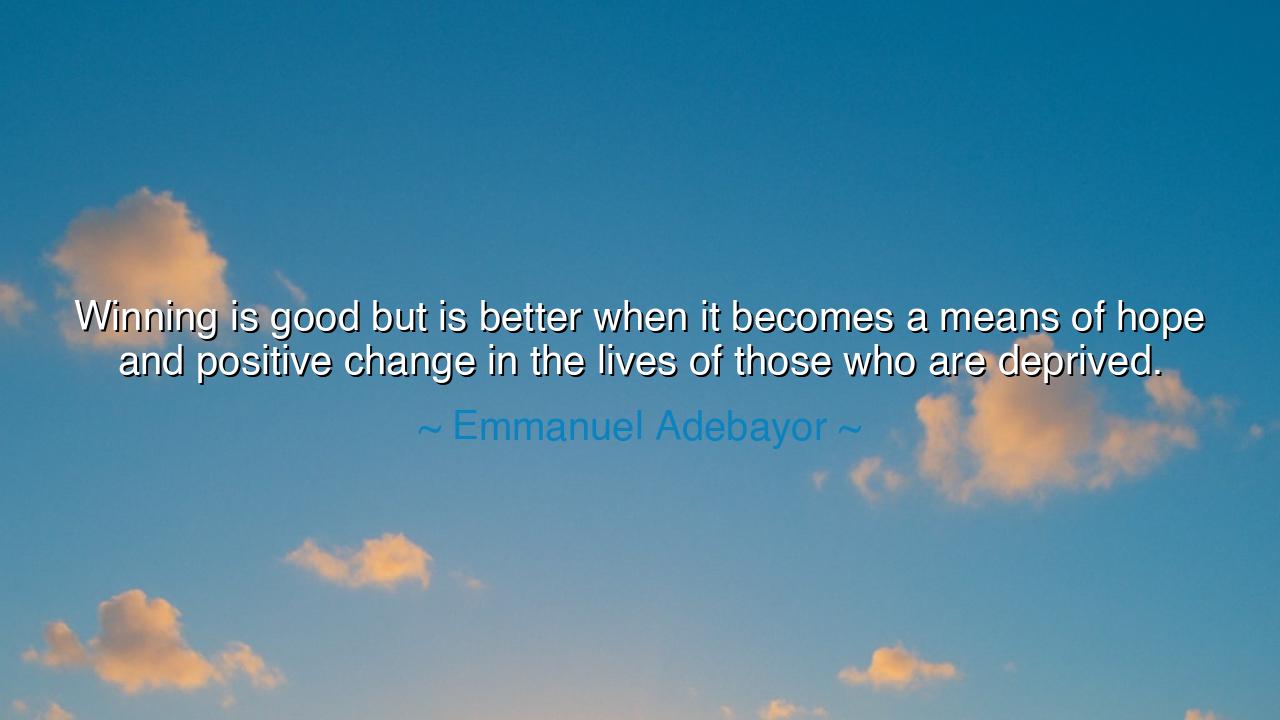
Winning is good but is better when it becomes a means of hope
Winning is good but is better when it becomes a means of hope and positive change in the lives of those who are deprived.






The words of Emmanuel Adebayor, “Winning is good but is better when it becomes a means of hope and positive change in the lives of those who are deprived,” carry the voice of one who has known both the roar of triumph and the silence of struggle. He reminds us that the crown of victory shines brightest not when worn for oneself alone, but when its light is shared with those who walk in shadows. For what is the meaning of winning, if it lifts only the victor and leaves the people still bowed in hunger, despair, and want?
The origin of this wisdom lies in Adebayor’s own journey. Born in Togo, a land where poverty and hardship were familiar companions, he rose to play among the giants of world football. Yet he never forgot the faces of those left behind: the child with no shoes to play, the mother with no food to serve, the village without water to drink. His victories on the field were sweet, but they became truly powerful when transformed into acts of generosity—building homes, supporting families, and offering hope to the deprived who once stood where he had stood.
History itself confirms his truth. Think of Nelson Mandela, who after emerging victorious from the prison of Robben Island, did not wield his freedom for revenge, but turned his triumph into positive change for an entire nation. His winning was not in personal glory but in the reconciliation of enemies, the lifting of a people long crushed under the weight of apartheid. Like Adebayor, Mandela understood that true victory is measured by how it transforms the lives of others.
There is also the story of Muhammad Ali, the boxer who declared himself “The Greatest.” His greatness was not only in the ring, where he toppled opponents with grace and fire, but in his decision to use his platform to speak for the voiceless. His winning became a weapon against injustice, his fame a banner of dignity for African Americans and the oppressed around the world. He, too, proved that victory without service is hollow, but victory used to inspire hope is eternal.
Adebayor’s teaching pierces deeper still, for it warns against the emptiness of selfish triumph. Too often, men win medals, titles, fortunes—and yet their victories leave no trace beyond their own names. Such triumphs die with the body. But when winning is used to plant seeds of hope, to create opportunities for the deprived, then its fruits endure for generations. The joy of the victor is multiplied into the joy of a people, and the legacy becomes not a trophy on a shelf, but lives changed forever.
The lesson for us all is profound: measure your victories not only by your own gain, but by the good they bring to others. Ask yourself, “Who has been lifted by my success? Who has found strength in my triumph?” For in these questions lies the difference between fleeting glory and eternal greatness. Winning for yourself alone is sweet; winning that heals and uplifts others is divine.
Practical actions flow from this truth. Whatever your arena—be it sport, business, art, or study—dedicate a portion of your triumphs to those in need. Share your resources, your time, your wisdom. Mentor the young, feed the hungry, build where there is nothing. Let your winning become a channel of positive change, and let your victories echo beyond your own life into the lives of the deprived who wait for a spark of hope.
Let future generations remember: true champions are not those who stand highest on the podium, but those who bend low to lift others from the ground. As Adebayor teaches, winning is good, but its highest calling is to be transformed into hope. And when victory serves the suffering, then it is no longer just a prize—it becomes a blessing, and its light will never fade.






TPThang Phan
I admire Emmanuel Adebayor’s view on winning. It’s one thing to win, but to use that win as a tool for hope and positive change in the lives of others is truly powerful. However, how often do we see this type of selflessness in the world of sports and business? Is it possible to cultivate this mindset in future generations, especially those in highly competitive fields?
TTHuynh thi thu thao
This quote speaks to the greater purpose of success. Winning can feel empty if it doesn’t bring about something positive in the lives of others, especially those who are deprived. But how do we balance personal ambition with the responsibility to give back? Can success still be fulfilling if it’s not used to create positive change, or does the true value of winning come when it’s shared with others?
KKKgoa Khoa
Emmanuel Adebayor’s perspective is inspiring. It’s easy to think of winning as a personal accomplishment, but when it becomes a means to help others, it takes on a whole new level of meaning. Do you think that athletes, celebrities, or successful individuals have a responsibility to use their platform for social change? How do we encourage those who succeed to also think about the broader impact of their victories?
CVchanci vlog
I really resonate with this quote by Emmanuel Adebayor. It’s not just about winning for the sake of personal glory but about using that success to inspire and uplift others. In a world where individual achievements are often celebrated, it’s refreshing to hear about the power of success as a tool for positive change. How do we shift our focus from self-centered success to using our platforms for greater good?